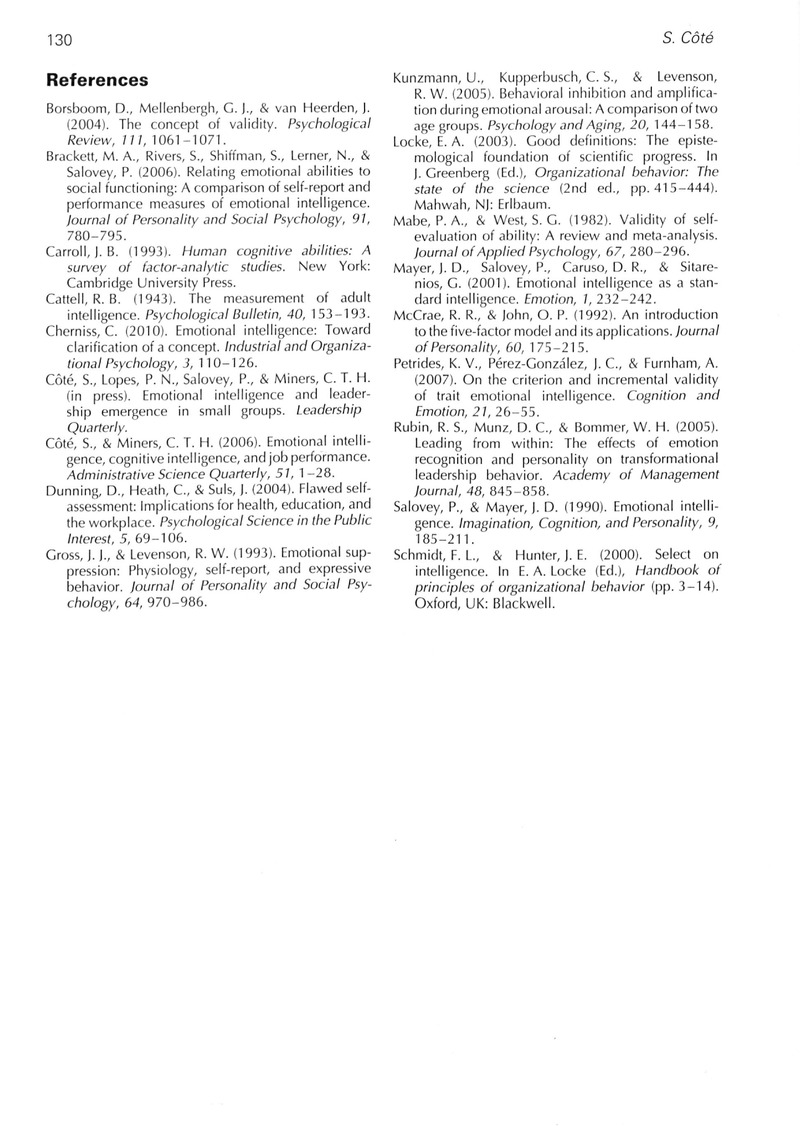Crossref Citations
This article has been cited by the following publications. This list is generated based on data provided by Crossref.
Smollan, Roy
and
Parry, Ken
2011.
Follower perceptions of the emotional intelligence of change leaders: A qualitative study.
Leadership,
Vol. 7,
Issue. 4,
p.
435.
Walter, Frank
Cole, Michael S.
der Vegt, Gerben S. van
Rubin, Robert S.
and
Bommer, William H.
2012.
Emotion recognition and emergent leadership: Unraveling mediating mechanisms and boundary conditions.
The Leadership Quarterly,
Vol. 23,
Issue. 5,
p.
977.
Iliescu, Dragos
Ilie, Alexandra
Ispas, Dan
and
Ion, Andrei
2013.
Examining the Psychometric Properties of the Mayer-Salovey- Caruso Emotional Intelligence Test.
European Journal of Psychological Assessment,
Vol. 29,
Issue. 2,
p.
121.
Côté, Stéphane
2014.
Emotional Intelligence in Organizations.
Annual Review of Organizational Psychology and Organizational Behavior,
Vol. 1,
Issue. 1,
p.
459.
Kong, Dejun Tony
2014.
Mayer–Salovey–Caruso Emotional Intelligence Test (MSCEIT/MEIS) and overall, verbal, and nonverbal intelligence: Meta-analytic evidence and critical contingencies.
Personality and Individual Differences,
Vol. 66,
Issue. ,
p.
171.
Costa, Ana
and
Faria, Luísa
2015.
The impact of Emotional Intelligence on academic achievement: A longitudinal study in Portuguese secondary school.
Learning and Individual Differences,
Vol. 37,
Issue. ,
p.
38.
MacCann, Carolyn
Lievens, Filip
Libbrecht, Nele
and
Roberts, Richard D.
2016.
Differences between multimedia and text-based assessments of emotion management: An exploration with the multimedia emotion management assessment (MEMA).
Cognition and Emotion,
Vol. 30,
Issue. 7,
p.
1317.
Elfenbein, Hillary Anger
2016.
Emotional division-of-labor: A theoretical account.
Research in Organizational Behavior,
Vol. 36,
Issue. ,
p.
1.
Elfenbein, Hillary Anger
and
MacCann, Carolyn
2017.
A closer look at ability emotional intelligence (EI): What are its component parts, and how do they relate to each other?.
Social and Personality Psychology Compass,
Vol. 11,
Issue. 7,
Beitler, Lena A.
Scherer, Sonja
and
Zapf, Dieter
2018.
Interpersonal conflict at work: Age and emotional competence differences in conflict management.
Organizational Psychology Review,
Vol. 8,
Issue. 4,
p.
195.
Völker, Juliane
2020.
An Examination of Ability Emotional Intelligence and Its Relationships with Fluid and Crystallized Abilities in a Student Sample.
Journal of Intelligence,
Vol. 8,
Issue. 2,
p.
18.
Chaudhary, Meena
Jaswal, Nidhi
and
Sohal, Anu
2023.
AI and Emotional Intelligence for Modern Business Management.
p.
113.
Haag, Christophe
Bellinghausen, Lisa
and
Jilinskaya-Pandey, Mariya
2023.
QEPro: An ability measure of emotional intelligence for managers in a French cultural environment.
Current Psychology,
Vol. 42,
Issue. 5,
p.
4080.



